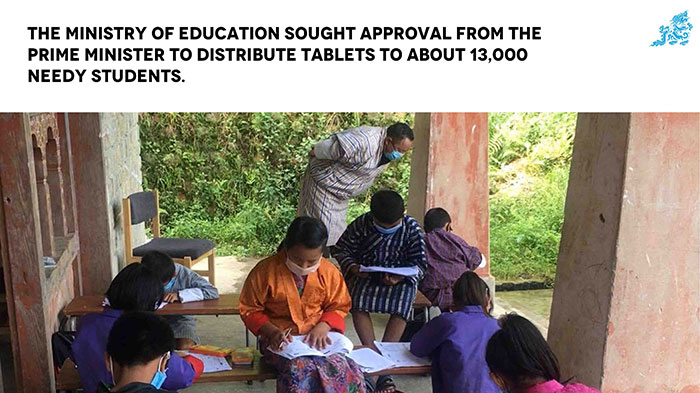
Without access to gadgets and internet in rural areas, teachers initiated mobile teaching
Yangchen C Rinzin
Prime Minister Dr Lotay Tshering has advised education ministry to tarry the plan to issue tablets for needy students following a proposal the ministry made for it to be included in the 12th Plan.
The ministry sought approval from the prime minister to distribute tablets to about 13,000 needy students.
The ministry proposed to procure 20,000 tablets, which could cost the government about Nu 260 million (M), including free data charges for students that could cost Nu 182M (Nu 9.1M per month). The free data of Nu 699 would be given for two years.
The ministry has also proposed laptops for about 9,500 teachers. On a cost-sharing basis, the cost could run up to Nu 237.5M.
Lyonchhen said that the concern was whether the tablets would be utilised as the way they should be.
“We’ve to be sure of how many actual needy students and how many gadgets in a year are we talking about,” Lyonchhen said. “Some may get tablets and, after that, what about maintenance? How many will actually take care of it? Maintenance would be expensive.”
Lyonchhen said that it was important to also consider the continuity. “Since the Education Flagship is also in the plan that aims for ICTisation, we should hold this plan for now. I am not ready to jump into this plan immediately.”
The free tablets are being proposed to complement the Learning Management System (LMS), which is being developed by the ministry to enhance e-Learning, which faced several issues last year when schools had to be closed.
LMS will be virtual teaching accessible to all students. Students and teachers will have access to quality online courses. Students will require a device to use the LMS effectively. Tablets will also help students during the school closure.
However, in some cases, even ICT teachers do not own laptops.
Education Secretary Karma Tshering, who shared the ministry’s midterm review last Sunday, said that this new activity was being proposed to support students who did not have access to gadgets or internet to continue education online during the pandemic.
“Pandemic or not, it’s important we give importance to ICT and we need to help needy students at least by giving devices,” he said.
The ministry reportedly has achieved ICT initiatives likes introducing ICT as a compulsory subject from Classes PP-XII, has introduced coding from primary classes, integration of ICT in other subjects, and other infrastructure development.
There is also a flagship programme that includes computer supplies, computer lab construction, training for ICT teachers, and ICT in colleges of education.
However, some of the observers shared that there was a need to relook into the proposal as to whether supports like free tablets would serve the purpose, to educate the children. Some shared that free tablets may not necessarily provide access to education or add to the learning.
The education ministry also shared that one of the issues and challenges for the 12th Plan was low internet bandwidth and a high monthly recurrent budget that pose a serious challenge to ICT integration in education.
Foreign minister Dr Tandi Dorji said that the giving of laptops or tablets should be aligned with how the Digital Drukyul Flagship will shape up. However, Lyonpo added that there is a need to provide free local content that students can access on tablets.
Finance secretary Nim Dorji said that before giving out tablets or internet data, it is important that the ministry first considered access to internet and other facilities to use the tablets/laptops. “We must first ensure that there is good internet connectivity. Otherwise, free tablets would be only a waste, like how providing two free uniforms were often misused before.”
The education secretary said that there was a need to enhance internet connectivity and bandwidth to support online education and online coding education. “There is also a need to allocate adequate budget provision of internet to schools.”
Despite the pandemic, the ministry managed to introduce e-Learning last year during the school closure in response to Covid-19 pandemic. The ministry recorded 442 Emergency in Education video lessons, 160,675 books for 31,235 students, and delivered 221 lessons through Radio to continue the education during closure.

